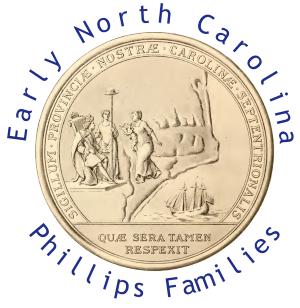Croatan
From ENC Phillips Group Wiki
The Croatan were a small Native Americans in the United States|Native American tribe living in the coastal areas of what is now North Carolina. They may have been a branch of the larger Roanoke tribe or allied with them.[1]
They lived in current Dare County, an area encompassing the Alligator River, Croatan Sound, Roanoke Island, and parts of the Outer Banks, including Hatteras Island. Now extinct as a tribe, they were one of the Carolina Algonquian peoples, numerous at the time of English encounter in the 16th century. The Roanoke territory also extended to the mainland, where they had their chief town on the western shore of Croatan Sound. Scholars believe the Algonquians had a total population of 5,000 to 10,000.[2]
The Roanoke and Croatan were believed to have been on good terms with English settlers of the Roanoke Colony. Wanchese, the last leader of the Roanoke, accompanied the English on a trip to England.
The Croatan, like other Carolina Algonquians, suffered from epidemics of infectious disease, such as smallpox in 1698. These decimated the tribes and left them subject to colonial pressure. They were believed to be extinct as a tribe by the early seventeenth century.
Nineteenth century claims
Based on legend, some people said that the modern Lumbee tribe, based in North Carolina, were descendants of the Croatan and survivors of the Lost Colony of Roanoke Island. There is no substantive historical evidence for this.
More recently the Lumbee have claimed descent from the Cheraw, a Siouan-speaking people. There is no direct historical evidence of this connection. The evidence available seems to indicate that the Lumbee may have some individual ancestors among certain Siouan tribes, who came together in the nineteenth century.
- REDIRECT Template:Citation needed
Late twentieth-century research has demonstrated that among surnames established as Lumbee ancestors were numerous mixed-race African Americans free in Virginia before the American Revolution, and their descendants who migrated to the Virginia and North Carolina frontiers in the late eighteenth and early nineteenth centuries. These "free people of color" were mostly descendants of white women and African men, who worked and lived together in colonial Virginia. These connections have been traced for numerous individuals and families through court records, land deeds and other existing historical documents.[3][4] In Robeson County, they may have intermarried with Native American survivors and acculturated as Indian.
Myth
A popular myth, not supported by any substantive documentation, tells that there were survivors of the Lost Colony of Roanoke, and that they joined the Croatan. The Lost Colony Center for Science and Research has excavated English artifacts within the territory of the former Croatan tribe. The artifacts may also be evidence of trade with the tribe, or of Indians' finding them at the former colony site. The Center is conducting a DNA study to try to determine if there are European lines among Croatan descendants.
Notes
- ↑ "Indian Towns and Buildings of Eastern North Carolina", Fort Raleigh National Historic Site, National Park Service, 2008, accessed 24 Apr 2010
- ↑ "Indian Towns and Buildings of Eastern North Carolina", Fort Raleigh National Historic Site, National Park Service, 2008, accessed 24 Apr 2010
- ↑ Paul Heinegg, Free African Americans of Virginia, North Carolina, South Carolina, Maryland and Delaware, 2005, accessed 15 Feb 2009
- ↑ J. Cedric Woods, "Lumbee origins: The Weyanoke-Kearsey connection", Southern Anthropologist, 2004, accessed 30 Jul 2008
References
- K.I. Blu: "Lumbee", Handbook of North American Indians, vol. 14: 278-295, Washington, DC: Smithsonian Institution, 2004
- A.S. Eterovich: Croatia and Croatians, and the Lost Colony, San Carlos, CA: Ragusan Press, 2003
- T. Hariot, J. White, J. Lawson: A vocabulary of Roanoke, Merchantville: Evolution Publishing, 1999
- Th. Ross: American Indians in North Carolina, South Pines, NC: Karo Hollow Press, 1999
- G.M. Sider: Lumbee Indian histories, Cambridge: Cambridge University Press, 1993
- S.B. Weeks: The lost colony of Roanoke, its fate and survival, New York: Knickbocker Press, 1891
- J.R. Swanton: "Probable Identity of the Croatan Indians." U.S. Dept. of the Interior, Office of Indian Affairs, 1933
- J. Henderson: "The Croatan Indians of Robeson County, North Carolina", U.S. Dept. of the Interior, Office of Indian Affairs, 1923
